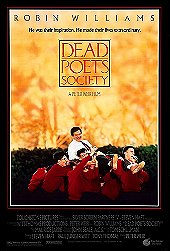It is difficult for me to simply describe my feelings towards Dead Poets Society. It's a film that lives on in your heart and your mind. It's an experience you'd be hard-pressed to forget. But at the same time, it's heavily flawed, and downright unlikable at times. Even frustrating. The third and final act of this film is worthy of applause, but the first and second leave a less satisfying impression.
In a tedious and brutal series of classes at the Welton Academy (a prep school for boys), a group of senior students have their outlook on life completely changed by their English teacher, John Keating. Though his methods are considered "unorthodox" by his peers, he quickly becomes a hero to the students of his class, as he teaches them to "seize the day!"
My mixed feelings towards this film are (partially) a result of the divide in quality between the first two acts, and the third. The first two acts are fairly light-weight. It's a mere suggestion of the depth to come. While the actors are in fine form and Robin Williams' performance as John Keating is mesmerizing and intensely likable, scenes without Williams (or two of the primary characters, Todd Anderson and Neil Perry, whom I'll discuss later) are either dull, distracting, or unlikable. This is partially due to the fact that many of the boys in this film are downright obnoxious. These depictions may be realistic, but an audience needs to like these boys if the film is to work.
John Keating's speeches and lessons are both interesting, and meaningful. They contain substance that is not found elsewhere (other than the third act). In the end, the first and second act lack the heft of the dramatic third act.
The final third of this film is truly enchanting. By means of an intense twist, the film is spun on its head. The acting is cranked up to an 11, and the story suddenly has weight. It has importance. It has intelligence. The final act of this film is nothing short of triumph. It's both poignant and rousing, but it is so very difficult to forgive the first two-thirds.
Part of the reason the first two thirds don't work very well, is that there is no clear main character. At first it seems to be Todd Anderson, but then the story sort of shifts to Neil Perry. Then back to Todd, and then back to Neil. Then Todd again. When one character takes center stage, the other one completely evaporates. Neither one ends up feeling like a main character. One could say that John Keating is the main character, but he isn't relate-able enough, as he portrays a sort of perfect human being, and his screen-time is insufficient for such a label anyway.
At any rate, when Neil and Todd ARE onscreen together, they are charming semi-leads. Their friendship is sweet and believable, and they remain the only truly likable characters, other than John Keating. The other boys are either undeveloped, uninteresting, or annoying. Though the two hour length serves the film well, in that one slowly grows on these characters over time, it's ultimately not enough time to develop all the characters, or remember them fondly.
The acting is top-notch. One has good reason to fret when a film takes place entirely around child actors (albeit, in the 18-20 range), but the performances are excellent. Robert Sean Leonard as Neil Perry must display the conflict between following his own passions, and following his father's rules and plans for him. Leonard turns a potentially one-dimensional character into a person with depth and personality. The same goes for Ethan Hawke as Todd Anderson, a performance that gets increasingly better as the film progresses. Of course, the performance that has achieved the most glory is Robin Williams as the miracle teacher, John Keating, and while the other performances are deserved to be lauded, Williams presence is truly magical.
The score, composed by Maurice Jarre, is - for the most part - atrocious. The film is scored with synthesizers, and as a result, the music is terribly dated. A dated sound is not necessarily a flaw, but the music is truly bad at times, and even distracting. Some of the beautiful shots in this film inspire grand music, and Dead Poets Society is without such. That is, until the final scene. This is when the score - like the film - becomes something truly important. In my humble and inexperienced opinion, this is one of the best and most notable uses of film music out there. It elevates the final scene to grand heights.
The final act is almost enough to save this film. It is something that feels both beautiful and important. And yet, the first two thirds feel so long, and they are so problematic, that it is difficult to forgive the film for this, no matter how lavishly wonderful the final act. Interestingly enough, while I was impatiently waiting for the film to end during the first two thirds, when the film ends, I almost felt as though it could have been longer. I wanted to know what was to happen after the credits roll. Does this prove I have become attached to the characters onscreen? Does this mean, that by almost starving for more at the end, that this film has overcome its problems that the first two acts possessed? Is this success? Ambiguity is not favorable in a critical review, but there it is.
6/10
 Login
Login